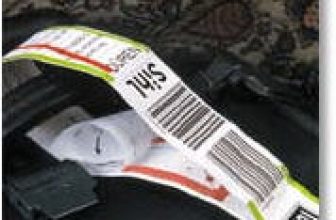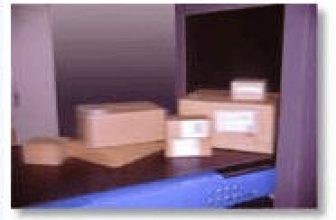
Avery Dennison RFID tag application case in the aviation industry
[ad_1]
Avery Dennison develops innovative identification systems and decoration solutions for global enterprises and consumers, and is a recognized leader in the industry. The company’s products include pressure-sensitive label materials, graphic media, retail apparel labels and branding systems, radio frequency identification inlays and labels, office supplies, special tapes, and a variety of products specifically designed for automotive, industrial and durable products Volume label. Ranked among the Fortune 500 companies in the United States, and ranked 69th among the “100 Best Employers in the United States” in 2006. Avery (Suzhou) Co., Ltd. is a wholly-owned company of Avery Dennison in China. The company’s total sales in 2006 were 5.6 billion U.S. dollars, and in 2008 total sales reached 6.7 billion U.S. dollars. There are more than 200 factories or sales organizations in the world, products are sold in 89 countries, and there are more than 22,000 employees. Since entering China in 1994, Avery’s Retail Consulting Services (RIS) department has established 4 production plants and 1 sales office in Nansha, Qingdao, Fuzhou, Suzhou and Shanghai, and has a sales network all over the country.
RFID is very suitable for the aviation market. It has no linear field of view requirement, can scan objects faster, and can quickly locate the location of items. RFID solutions provide high returns on investments by airlines, airports and security agencies. Provides huge opportunities for improving efficiency and customer service. RFID baggage tag tracking reduces the loss rate by as much as 40%, improves the chances of on-time departure, and provides more commercial aviation security. As Vegas McCarran International Airport was one of the pioneers, where the United States used RFID tags. According to the estimates of the International Air Transport Association (IATA), RFID baggage tags will save the aviation industry 700 million U.S. dollars each year and break this record in the next year or several years of operation. It costs about $100 to find the missing package, and missing luggage is a key factor affecting customer satisfaction.
Officials at Hong Kong International Airport stated that the cost of handling baggage at Hong Kong International Airport has dropped to 7 to 4 yuan per piece. Because barcodes are easily damaged in the handling of luggage and parcels, and the scanning success rate is only 67% to 80%. The success rate of reading RFID tags in the same time is between 97% and 100%. The International Air Transport Association estimates that RFID baggage tags will reduce the loss rate of accidental baggage by 30% to 40%, because there are almost no errors in RFID reading baggage tags. More importantly, through RFID radio frequency identification, you can quickly find packages that require re-security or priority processing. The RFID tag recognizes the package very quickly, so it can be quickly sent to the correct destination. Finally, RFID tags have not yet provided passengers with an additional identification. The post-911 security procedures stipulate that luggage will be deleted if the passenger does not show up. RFID tags can quickly locate and identify needed luggage, improving the chances of airlines’ flights departing on time.
On May 15, 2009, Avery Dennison’s RFID department will cooperate with Motorola and Print-O-Tape to provide Hong Kong Airport Authority with more than 70 million RFID-enabled baggage tracking tags. Motorola recently won a multi-year project contract. Hong Kong International Airport is one of the first airport pioneers to adopt RFID technology, which can greatly improve the reliability and efficiency of baggage handling systems. The airport will use Avery Dennison’s AD-833 RFID inlay, Motorola’s hardware and Print-O-Tape, which is responsible for luggage tags.
Wu Ziqi, deputy director of airport operations of the Hong Kong Airport Authority, said that in order to maintain the status of Hong Kong International Airport as a major regional and international aviation center, they promise to provide passengers with comfortable, fast service and the most advanced facilities. The application of RFID technology proves its continuous efforts to achieve high-quality services.
Unlike traditional barcode labels that require a scanner to read the label in sight, Avery Dennison’s AD-833 RFID label is specially designed for the needs of the aviation industry, and can be read at a long distance without direct contact with the label. The RFID system can achieve an average reading rate of over 97%, which is more reliable than the 80% reading rate of the general traditional barcode system. The RFID tag system enables the baggage handling system of the Hong Kong Airport Authority to track baggage more accurately, help baggage be delivered in time, and airport flights and passengers depart on time. The system also helps improve luggage delivery and enhance customer service levels.
Avery Dennison é vice president and general manager of the RFID division Jack Farrell said that they are very pleased to be able to provide tag inlays for this important project. Based on years of accumulated experience in designing and producing RFID tags, coupled with Motoroà’s leading position in the industry, and Print-O-Tape’s experience in printing luggage tags, the tripartite cooperation will lead RFID to develop more innovations in the aviation industry Applications.
Hong Kong International Airport currently uses RFID luggage tags to check in luggage for passengers in multiple locations, including the check-in counters at Terminal 1 and Terminal 2, and the downtown check-in at the Airport Express Kowloon Station and Hong Kong Station. Airport check-in counters and upstream check-in facilities in the Pearl River Delta region. Currently, more than 70 airlines have participated in the project.
[ad_2]





